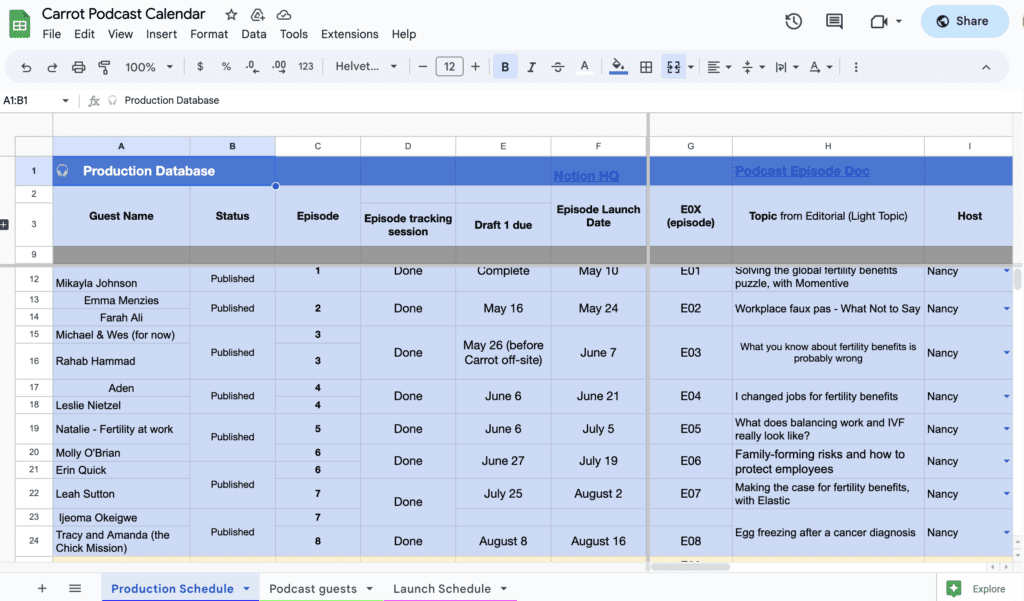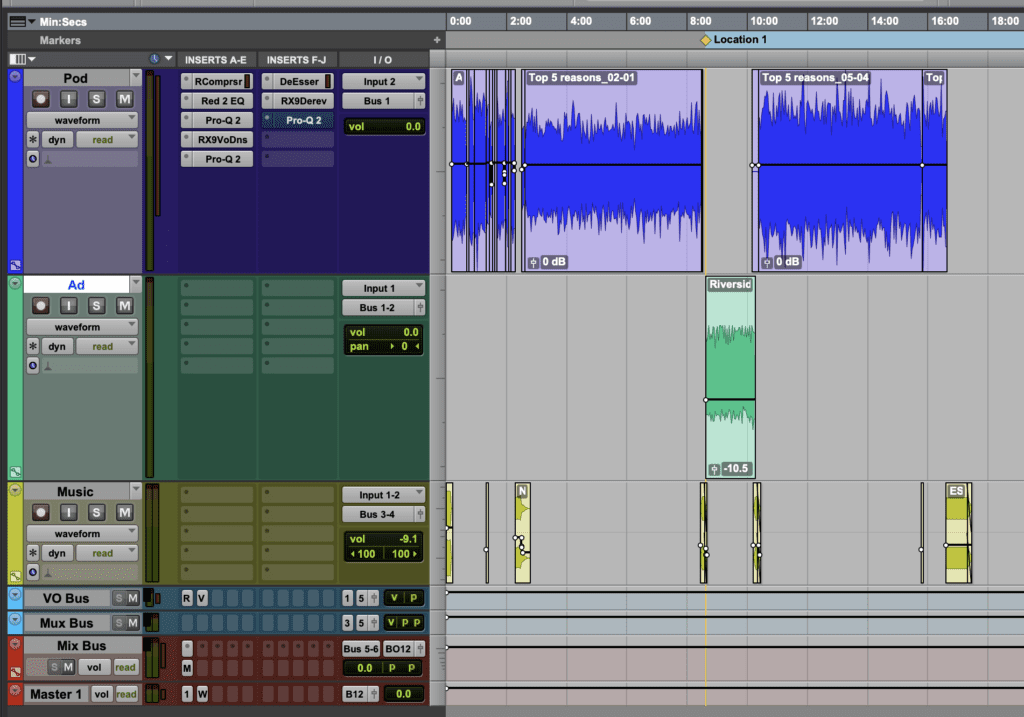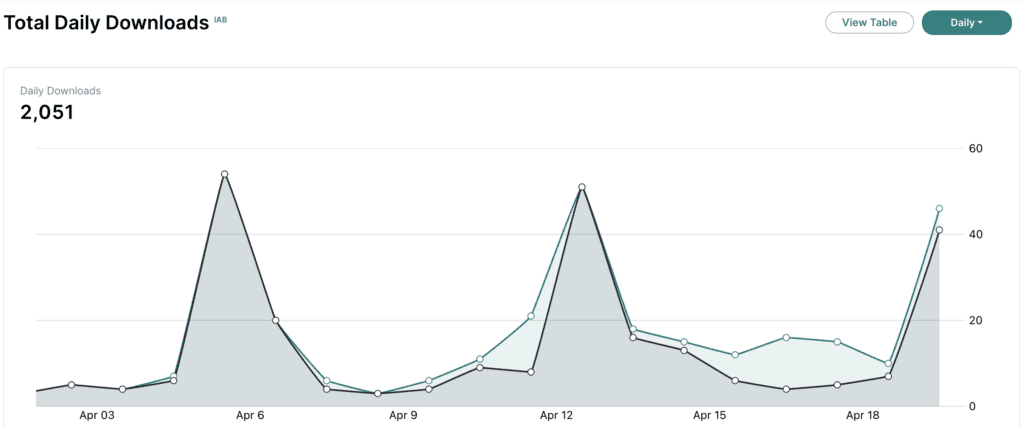
Podcast Producer: What Does A Producer Do?
Ah, the elusive “producer” – a title often thrown around with an air of prestige and mystery, as if it were some sort of secret society membership card. In the world of podcasting, the term “podcast producer” has become quite the buzzword, but what does it actually mean?
Well, it’s not as straightforward as you might think. The role of a podcast producer can vary widely depending on the show they work on or who you ask.
So, let’s strip away the glamour and intrigue, and take a stroll through the multifaceted realm of podcast production to uncover the truth behind these audio wizards.
What Does A Podcast Producer Do?
Now that we’ve poked a bit of fun at the enigmatic title, let’s get down to brass tacks and explore what a podcast producer might actually do for a show.
Pre-production
One of the essential tasks of a podcast producer is laying the groundwork for a successful show. For instance, Gimlet Media, has an entire team dedicated to researching and developing fresh ideas for their shows.
The planning stage involves hashing out the podcast’s format, style, and target demographic. This ensures the final product aligns with the creators’ vision and appeals to the intended audience.
Scheduling and Coordination
A skillfully orchestrated podcast can significantly impact the distinction between a seamless production and a disordered fiasco. Glancing through job postings for podcast producers, it’s not uncommon to encounter “excellent organizational skills” specified as a prerequisite.
In this capacity, producers devise intricate calendars, oversee recording sessions. Also, they may handle numerous episodes or shows concurrently.
Producers frequently grapple with time constraints. A considerable number of podcasts operate under stringent deadlines. Just envision the pressure of working on a daily podcast. Oof!

The “Baby Steps” Podcast Production Calendar. Produced by The Podcast Haven
Guest Management
Finding the perfect guest for an episode can be a game-changer.
A podcast producer might research potential guests, coordinate interview times, and provide them with clear instructions to ensure a smooth and engaging conversation.
Scriptwriting
A well-crafted script can make or break a podcast episode. Producers may take on the role of scriptwriter, refining the copy to ensure it flows naturally and captivates the audience.
For example, Wondery, a top podcast network, has dedicated writers and editors who work closely with producers to develop compelling storylines and scripts for their shows.
Recording and Technical Support
Even the most seasoned podcasters can run into technical hiccups. Podcast producers must be ready to troubleshoot recording issues.
At a glance, producers are often responsible for ensuring optimal sound quality, setting up microphones, and guiding hosts through the recording process, all while keeping an ear out for potential issues.
This could be the role of the shows audio engineer. Typically, audio engineers have more technical knowledge when it comes to recording. But, producers often work side by side with audio engineers.
Audio Editing and Post-Production
Post-production magic can transform raw recordings into captivating podcasts. Producers may collaborate with audio engineers to edit out mistakes, balance levels, and add music or sound effects, creating a polished final product.
Job descriptions for podcast producers frequently emphasize skills like proficiency in audio editing software and a keen ear for detail.
Marketing and Promotion
A great podcast is nothing without listeners, and that’s where marketing comes into play. Producers may develop eye-catching promotional materials, manage social media accounts, or pitch their shows to podcast directories like Podnews.net.
They also keep an eye on industry trends and collaborate with other creators to expand their show’s reach.
Analytics and Performance Tracking
Successful podcasters know the importance of tracking listener data. Producers analyze statistics from hosting platforms to identify trends, gauge audience engagement. This helps the podcast team make data-driven decisions about their show’s content and marketing strategies.
By staying in tune with listener feedback and preferences, producers can continuously refine their podcasts and keep audiences coming back for more.
Jack Of All Trades
As you can see, podcast producers are the unsung heroes of the podcasting world, handling a wide range of tasks that ultimately contribute to the show’s success.
Whether they’re brainstorming creative ideas, finessing audio quality, or analyzing listener data, these multitaskers work tirelessly behind the scenes to ensure our favorite podcasts stay fresh, engaging, and entertaining.
Four Types Of Podcast Producers
Just when you thought we’d covered everything there is to know about podcast producers, surprise! There’s more. As if navigating the nebulous world of podcast production wasn’t enough, we’re about to throw a curveball your way: different types of producers.
That’s right – it’s like the podcasting universe decided to double down on the confusion. So, brace yourself, and let’s dive into the delightful complexity of associate producers, producers, executive producers, and showrunners.
Buckle up, because we’re about to embark on a wild ride through the who’s who of podcasting production roles!
Associate Producer
An associate producer is often an entry-level or junior role on a podcast production team. They typically assist the producer and other team members with a variety of tasks, such as research, scriptwriting, guest coordination, and basic audio editing.
Their responsibilities may be more limited in scope compared to the producer, but they play a crucial role in supporting the overall production process.
Producer
As we’ve discussed, a podcast producer is responsible for managing many aspects of a show’s production, from pre-production planning to post-production editing.
They work closely with the host(s), writers, and other team members to shape the podcast’s vision, coordinate schedules, manage guests, oversee technical aspects, and ensure the final product meets the desired quality standards.
The producer’s role can vary greatly depending on the size and needs of the podcast.
Executive Producer
The executive producer is typically a higher-level role that oversees the entire production process and makes key creative and financial decisions.
They may manage multiple podcasts within a network or production company and have a more significant say in the show’s direction and content.
Executive producers are often responsible for managing budgets, securing funding or sponsorships, and coordinating with other stakeholders, such as advertisers or distributors.
Showrunner
In the podcasting world, the term “showrunner” is less common than in television, but it can still apply. A showrunner is typically the person responsible for the overall creative vision and day-to-day management of a podcast.
They may be the main driving force behind the show’s concept and content, working closely with writers, producers, and other team members to ensure the podcast stays true to its intended direction.
In some cases, the showrunner and producer roles may overlap or be combined, particularly in smaller podcast productions.
Wrapping Up Producer Roles
While these descriptions provide a general understanding of the roles in podcasting, it’s essential to note that the specific responsibilities and hierarchy may vary depending on the podcast’s size, structure, and production team.
How To Get Hired As A Podcast Producer
Embarking on the path to becoming a podcast producer can be a thrilling and rewarding adventure. Here are some pointers to help you take the first steps and cultivate the necessary skills for this diverse role.
Immerse Yourself in the Industry
Begin by listening to an array of podcasts to grasp various formats, styles, and genres. Observe what succeeds and what falls short.
Stay current with industry news and trends by frequenting websites like Podnews.net, subscribing to newsletters, or participating in online podcasting communities.
Acquire Audio Editing and Recording Skills
Next, refine your technical abilities by learning how to utilize audio editing software such as Audacity, GarageBand, or Adobe Audition.
Acquaint yourself with diverse recording equipment and techniques to ensure clean, professional-grade audio capture.

Editing My Podcast
Launch Your Own Podcast
Undoubtedly, one of the most effective methods for mastering podcast production is to establish your own show.
This hands-on experience will provide you with a comprehensive understanding of the entire production process, from conceptualization to promotion.
Additionally, it serves as an excellent opportunity to demonstrate your skills to potential employers or clients.
On a side note, I host my own podcast called Clipped. Clipped is a show dedicated to teaching podcasting, with the aim of assisting you in starting, expanding, and monetizing a podcast.
Consider Volunteering or Interning
Initially, you might want to offer your abilities to assist with an existing podcast or take up an internship at a podcast production company.
In doing so, you’ll gain invaluable real-world experience, establish connections within the industry, and possibly pave the way for future opportunities.
Forge Connections with Podcast Creators
Furthermore, make a point of attending podcast conferences, workshops, or meetups in order to forge connections with other creators and professionals in the field.
Networking can potentially result in collaborations, mentorship, or employment prospects.
Enhance Your Storytelling and Writing Abilities
Moreover, a proficient podcast producer understands the importance of crafting engaging narratives that captivate listeners.
Hone your storytelling and scriptwriting abilities by composing blog posts, articles, or even short stories.
Stay Organized and Pay Attention to Detail
Additionally, successful podcast producers are skilled at handling multiple tasks and meeting deadlines. Cultivate your organizational abilities and learn to manage your time effectively.
Acquire Marketing and Promotion Techniques
Equally important is comprehending how to market and promote a podcast for its ultimate success.
Delve into social media marketing, content marketing, and SEO strategies in order to bolster your show’s audience and visibility.
Continuously Learn and Enhance Your Skills
Since the podcasting landscape is constantly evolving, maintain a curious and open mindset to acquire new methods, tools, and best practices.
By relentlessly refining your skills, you’ll become a more adaptable and valuable podcast producer.
Create a Portfolio
As you gather experience and develop podcasts, compile a portfolio that showcases your work. Incorporate audio clips, scripts, and promotional materials that exhibit your skills and versatility as a producer.
Bear in mind that perseverance and passion are vital to standing out in this competitive and rapidly changing industry.
Podcast Producer Salary
Finally, we get to the money. But, before you start seeing dollar signs, here’s a disclaimer:
It’s important to recognize that salary ranges for podcast producers can fluctuate considerably, contingent upon factors such as experience, location, podcast size, and whether they are employed by a production company or operating as freelancers.
Also, these ranges are pulled some online podcast producer job descriptions.
Associate Producer
- $40,000 per year – $60,000 per year
Producer
- $50,000 per year – $90,000 per year
Executive Producer
- $60,000 – $150,000+ per year
Showrunner
- $90,000 per year – $150,000+ per year
Again, keep in mind that these salary ranges are only rough estimates, and actual compensation may vary widely.
Additionally, podcast producers may also earn income through other means, such as bonuses, profit-sharing, or royalties from the podcasts they work on.
Bringing It Home
Phew, I just threw a lot at you. But, it’s important to grasp this info to really understand the role of a podcast producer. Plus, in the ever-expanding universe of podcasting, producers undoubtedly play an integral role in bringing captivating audio content to life.
As we’ve explored the various types of producers, it’s become evident that each role comes with its distinct responsibilities, illustrating how these behind-the-scenes maestros truly serve as the backbone of successful podcasts.
Consequently, the journey to becoming a podcast producer demands dedication, skill development, and a passion for storytelling.
Thus, whether you’re just starting out or already an industry pro, gaining an understanding of the multifaceted world of podcast production and the potential rewards it offers can empower you to navigate this exciting and dynamic landscape.
Hit Me Up On Social Media
Listen To My Podcast Clipped – A Podcast Teaching Podcasting
Latest Blog Posts
- Samson Q2U Podcast Microphone Features and Review
- The Complete Guide To Recording a Podcast with Riverside.fm
- Zoom H6: The Ultimate Portable Recording Tool For Podcasters
- How To Make Money With Amazon Affiliate Marketing
My Amazon Influencer Storefront
Signup For The Newsletter For Weekly Podcasting Resources, and Tips
Contact Form

